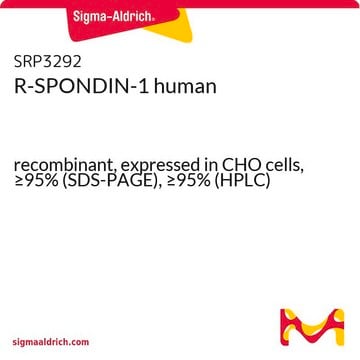GF173
Noggin Protein, Human Recombinant
The human Noggin recombinant protein belongs to a group of diffusible proteins which bind to ligands of the TGF-β family & regulate their activity by inhibiting their access to signaling receptors.
Synonyma:
NOG, SYM1, SYNS1
Přihlásitk zobrazení cen stanovených pro organizaci a smluvních cen
About This Item
UNSPSC Code:
12352202
eCl@ss:
32160405
NACRES:
NA.77
Doporučené produkty
General description
Noggin belongs to a group of diffusible proteins which bind to ligands of the TGF-β family and regulate their activity by inhibiting their access to signaling receptors. The interplay between TGF-β ligands and their natural antagonists has major biological significance during development processes, in which cellular response can vary considerably depending upon the local concentration of the signaling molecule. Noggin was originally identified as a BMP-4 antagonist whose action is critical for proper formation of the head and other dorsal structures. Consequently, Noggin has been shown to modulate the activities of other BMPs including BMP-2,-7,-13, and -14. Targeted deletion of Noggin in mice results in prenatal death and recessive phenotype displaying a severely malformed skeletal system. Conversely, transgenic mice over-expressing Noggin in mature osteoblasts display impaired osteoblastic differentiation, reduced bone formation, and severe osteoporosis. Recombinant human Noggin is a 46 kDa disulfide-linked homodimer (120-10C) consisting of two 206 amino acid polypeptide chains. Monomeric glycosylated Noggin migrates at an apparent molecular weight of approximately 28.0-33.0 kDa by SDS PAGE analysis under reducing conditions.
Product Source: HEK293 cells
Specificity
Cross Reactivty
Mouse, Chicken
Mouse, Chicken
Application
Research Category
Stem Cell Research
Stem Cell Research
Research Sub Category
Growth Factors & Receptors
Growth Factors & Receptors
Quality
Bioactivity assay: Determined by its ability to inhibit 5.0 ng/ml of BMP-4 induced alkaline phosphatase production by ATDC chondrogenic cells. The expected ED50 for this effect is 2.0-3.0 ng/ml of Noggin.
Physical form
Product is filtered through a 0.2 micron filter before lyophilization.
Storage and Stability
Store at -20°C for up to 6 months from date of receipt.
Disclaimer
Unless otherwise stated in our catalog or other company documentation accompanying the product(s), our products are intended for research use only and are not to be used for any other purpose, which includes but is not limited to, unauthorized commercial uses, in vitro diagnostic uses, ex vivo or in vivo therapeutic uses or any type of consumption or application to humans or animals.
Storage Class
11 - Combustible Solids
wgk_germany
WGK 1
flash_point_f
Not applicable
flash_point_c
Not applicable
Osvědčení o analýze (COA)
Vyhledejte osvědčení Osvědčení o analýze (COA) zadáním čísla šarže/dávky těchto produktů. Čísla šarže a dávky lze nalézt na štítku produktu za slovy „Lot“ nebo „Batch“.
Již tento produkt vlastníte?
Dokumenty související s produkty, které jste v minulosti zakoupili, byly za účelem usnadnění shromážděny ve vaší Knihovně dokumentů.
Sortimentní položky
Human pancreatic cancer organoid biobank (PDAC organoids) with various KRAS mutations to aide in 3D cell culture and cancer research applications.
Náš tým vědeckých pracovníků má zkušenosti ve všech oblastech výzkumu, včetně přírodních věd, materiálových věd, chemické syntézy, chromatografie, analytiky a mnoha dalších..
Obraťte se na technický servis.








